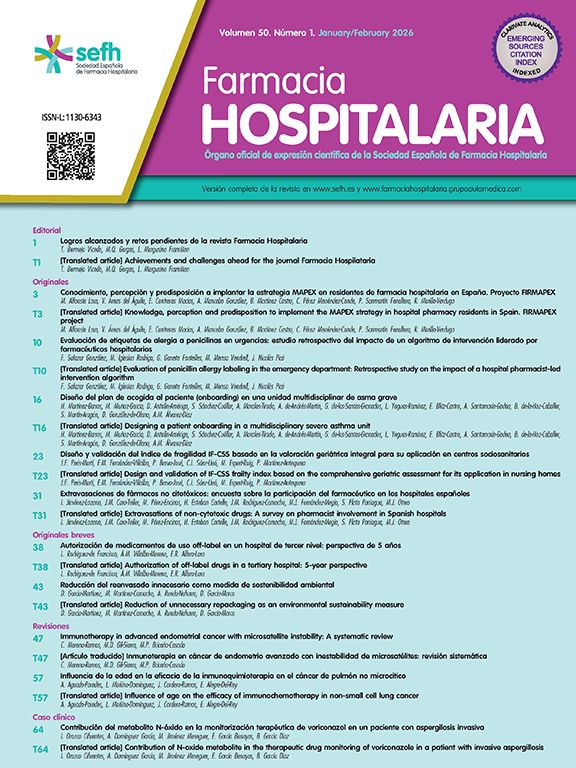To describe interventions carried out by nurses in the Pharmaceutical Care Unit upon discharge and in Outpatient Consultation (FACE) with the aim of promoting effective, safe and efficient pharmacotherapy for hospitalised patients.
MethodA descriptive study of nursing activity carried out in the Outpatient Consultation Unit between April 2008 and March 2009. The nurse performs five specific, formalised activities: clarifying differences in the medical records related to drugs allergies or intolerances, identifying pharmacotherapy discrepancies between acute and chronic treatment, identifying opportunities for improving pharmacotherapy, contributing to patient education about his/her treatment upon admission and dispensing limited duration drugs (less than 30 days) upon discharge to avoid accumulation of medication at home.
ResultsDuring the study period the nurse took part in the pharmacotherapy administered to 1360 patients (57.6% of total patients treated by the integral pharmaceutical care team), for a total of 1709 individual interventions. These interventions were performed in order to clarify differences in medical records regarding drug allergies or intolerances (n=111), to identify pharmacotherapy discrepancies between acute and chronic treatment (n=118), to identify opportunities for improving pharmacotherapy (n=263), and upon discharge in order to educate the patient about his/her treatment (n=31) and to dispense limited duration drugs (n=1186).
ConclusionsThe nurse's contribution to the integral pharmaceutical care team helps to improve the quality of pharmacotherapy in terms of effectiveness, safety and efficiency pharmacotherapy.
Describir las intervenciones desarrolladas por la enfermera adscrita a la Unidad de Atención Farmacéutica al alta y en Consultas Externas (FACE) con el fin de promocionar una farmacoterapia efectiva, segura y eficiente en el paciente hospitalizado.
MétodoEstudio descriptivo de la actividad de enfermería asignada a la Unidad FACE entre abril de 2008 y marzo de 2009. La enfermera tiene asignadas cinco actividades específicas y protocolizadas que son: clarificar diferencias en los registros de alergias/intolerancias a medicamentos, identificar discrepancias relativas al tratamiento farmacoterapéutico crónico, identificar oportunidades de mejora farmacoterapéutica, mejorar el conocimiento de los tratamientos prescritos al alta y evitar el acúmulo de medicación en los domicilios mediante la dispensación de tratamientos de duración limitada (inferior a 30 días).
ResultadosDurante el periodo de estudio la enfermera actuó en 1.360 (57,6%) pacientes de los 2.362 pacientes atendidos por la Unidad FACE. La enfermera realizó un total de 1.709 intervenciones de las cuales 111 fueron para resolver diferencias en el registro de alergias/intolerancias a medicamentos, 118 para solucionar discrepancias en el tratamiento crónico, 263 fueron por identificación de oportunidades de mejora farmacoterapéutica, 1.186 dispensaciones de tratamientos de duración limitada y 31 estuvieron orientadas a mejorar la educación farmacoterapéutica de los pacientes al alta hospitalaria.
ConclusionesLa enfermera contribuye a la consecución de los objetivos generales de la unidad FACE y por lo tanto a la mejora de la calidad farmacoterapéutica en términos de efectividad, seguridad y eficiencia.
This study was partly presented as a speech in the 20th Jornadas Nacionales de Supervisión de Enfermería (National Conference on Nursing Supervision), held in Valencia in March 2009: “Impacto en la calidad farmacoterapéutica de las intervenciones de la enfermera de la Unidad de Atención Farmacéutica al Alta Hospitalaria y en Consultas Externas” (Impact on pharmaceutical quality of nursing interventions in the Pharmaceutical Care Unit on discharge and Outpatient Care.








